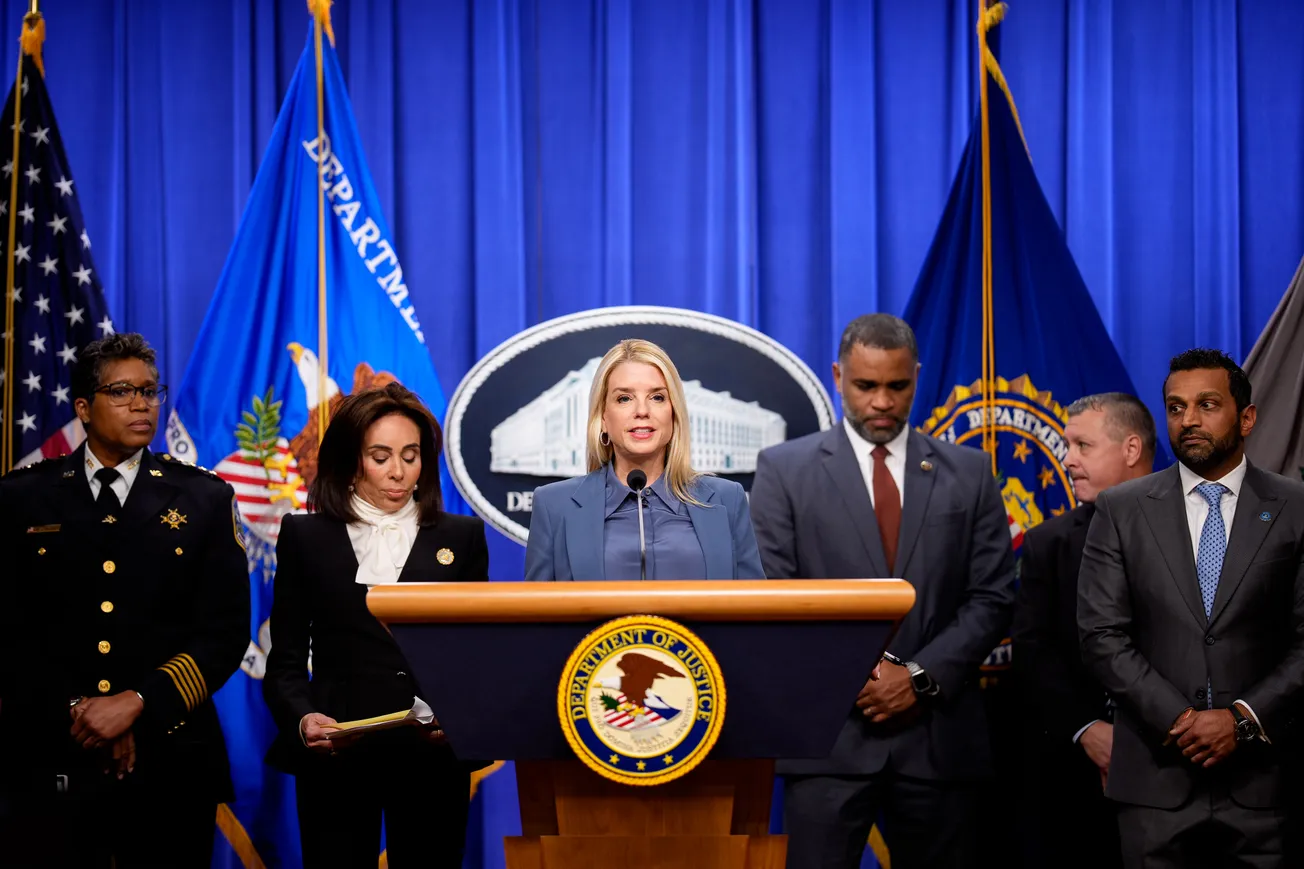By Virginia Allen , Tony Kinnett , Fred Lucas , Tyler O'Neil , The Daily Signal | March 08, 2024
President Joe Biden delivered his 2024 State of the Union address in the House Chamber of the U.S. Capitol on Thursday night.
During the 67-minute speech, frequently interrupted by applause from fellow Democrat senators and members of Congress, Biden spoke on a wide range of issues, from border security and the economy to abortion and foreign policies relating to Israel and Ukraine.
The president made numerous claims, many of them contentious and sharply partisan. The Daily Signal fact-checked many of those claims to assess whether they were truthful and accurate.
1. ‘Dagger at the Throat of American Democracy’
Biden compared the Jan. 6, 2021, Capitol riot to the U.S. Civil War of the 1860s.
“Insurrectionists stormed this very Capitol and placed a dagger at the throat of American democracy,” he said.
“Jan. 6 and the lies about the 2020 election, and the plots to steal the election, posed the gravest threat to our democracy since the Civil War,” Biden said. “But they failed. America stood strong and democracy prevailed.”
If Biden was saying no attack happened on the Capitol between 1865 and 2021, that would be inaccurate.
In 1954, four Puerto Rican terrorists attacked the Capitol. Unlike those who got inside the Capitol building two years ago, the 1954 terrorists were armed with guns. The four opened fire from the House Gallery, wounding five lawmakers: Reps. Alvin Bentley, Ben Jensen, Clifford Davis, George Hyde Fallon, and Kenneth Roberts.
In 1971, a domestic terrorist group, the Weather Underground, bombed the Capitol, causing $300,000 worth of damage. Luckily, no one was killed or injured.
The so-called Weathermen returned in 1983 and set off another bomb that “tore through the second floor of the Capitol’s North Wing,” according to the Senate’s history website. There were no fatalities.
As for Biden’s reference to “insurrectionists,” hundreds have been convicted in connection with the Jan. 6 riot, but not one was convicted of insurrection. But some were charged with sedition.
The term “insurrection” has a specific legal definition under the U.S. Code (U.S.C. 2383), which says:
Whoever incites, sets on foot, assists, or engages in any rebellion or insurrection against the authority of the United States or the laws thereof, or gives aid or comfort thereto, shall be fined under this title or imprisoned not more than 10 years, or both; and shall be incapable of holding any office under the United States.
According to Biden’s own Justice Department, none of the 950 arrested in connection with the riot was charged with insurrection.
Prosecutors did charge 50 defendants with conspiracy, and four have been convicted of seditious conspiracy. The other conspiracy-related charges were conspiracy to obstruct a congressional proceeding, conspiracy to obstruct law enforcement during a civil disorder, or conspiracy to injure an officer.
Seditious conspiracy (under U.S.C. 2384) is defined this way:
If two or more persons in any State or Territory, or in any place subject to the jurisdiction of the United States, conspire to overthrow, put down, or to destroy by force the Government of the United States, or to levy war against them, or to oppose by force the authority thereof, or by force to prevent, hinder, or delay the execution of any law of the United States, or by force to seize, take, or possess any property of the United States contrary to the authority thereof, they shall each be fined under this title or imprisoned not more than [20] years, or both.
—Fred Lucas
2. 'Cutting the Federal Deficit’
Biden twice took credit for cutting the federal deficit, and later said he wanted to cut it further by hiking taxes on corporations and the wealthy.
He first noted that under his administration, Medicare now has the authority to negotiate lower prices for prescription drugs similar to that of the Department of Veterans Affairs.
“That’s not just saving seniors money,” Biden said. “It’s saving taxpayers money, cutting the federal deficit by $160 billion because Medicare will no longer have to pay exorbitant prices to Big Pharma.”
Later, Biden said, “I’ve already cut the federal deficit by over $1 trillion.”
“I signed a bipartisan budget deal that will cut another trillion dollars over the next decade,” he said. “And now it’s my goal to cut the federal deficit $3 trillion more by making big corporations and the very wealthy finally pay their fair share.” He used variations on the terms “fair” and “fair share” at least nine times.
However, the federal budget deficit is set to increase every year for the next decade, wrote David Ditch, a senior policy analyst in the Grover M. Hermann Center for the Federal Budget at The Heritage Foundation.
“When deficits get too high, as happened during the COVID-19 pandemic, it adds to inflationary pressures on the economy. If current trends continue, driven by the growth of spending as a share of the economy, deficits will balloon even in years without a recession or a major war,” Ditch wrote.
“The first-ever $1 trillion deficit happened in fiscal year 2009 and helped fuel the tea party movement in response. Incredibly, not only are $1 trillion deficits now standard operating procedure, but the federal government is set to crack $2 trillion deficits every year as soon as 2031—even sooner if any new legislation expands the [Washington] swamp,” Ditch added.
The Congressional Budget Office projects the government will spend more on interest payments in 2024 on the accumulated debt than on national defense.
—Fred Lucas
The president also claimed that “the last administration enacted a $2 trillion tax cut that overwhelmingly benefits the very wealthy and the biggest corporations and exploded the federal deficit.”
That’s untrue. Those in income brackets earning $200,000 or more paid more taxes in 2018 compared with 2017. Those making less than $200,000 annually paid less in taxes.
—Tony Kinnett
3. COVID-19 Was ‘Worst Economic Crisis in a Century’
Biden called the COVID-19 pandemic the “worst economic crisis in a century.” That’s objectively incorrect. The Great Depression, which lasted from 1929 to 1941, resulted in 24.9% of Americans being forced into unemployment. At the height of the COVID-19 pandemic, in the second quarter of 2020, unemployment hit 13%, and the pandemic only lasted two years.
—Tony Kinnett
4. ‘Most Americans’ Said to Support Roe v. Wade
“Like most Americans, I believe Roe v. Wade got it right,” Biden said of the 1973 Supreme Court ruling making abortion legal nationwide.
The Supreme Court overturned Roe in June 2022, ruling that there was no constitutional right to abortion. In 2023, 44% of Americans identified as pro-life, according to a Gallup poll, while 52% identified as pro-abortion, and 4% had no opinion.
Biden used the story of Texas resident Kate Cox, who was a guest of the president and in the audience Thursday night, to advocate for abortion.
Cox, according to Biden, became pregnant with “a fetus with a fatal condition,” and because of Texas law protecting the unborn, Cox went to another state to have an abortion.
Cox’s baby had a genetic condition known as trisomy 18, according to reporting by The Daily Signal’s Mary Margaret Olohan.
“Trisomy 18 is a condition in which a baby had an extra copy of chromosome 18, making it highly likely that the baby would die in the womb or shortly after birth—though some babies with trisomy 18 do survive, such as the daughter of former Sen. Rick Santorum, R-Pa.,” Olohan reported.
—Virginia Allen
5. ‘Toughest Set of Border Security Reforms We’ve Ever Seen’
Biden touted his support of a “bipartisan” bill that, according to the president, included the “toughest set of border-security reforms we’ve ever seen.”
He claimed that the bill would “bring order to the border.”
The border bill Biden was referring to failed in the Senate in February because it “codified Joe Biden’s open border,” Sen. Ted Cruz, R-Texas, said on his podcast “Verdict with Ted Cruz.”
The Senate’s 370-page bill included about $20 billion in border-related spending and directed the Department of Homeland Security to close the southern border “during a period of 7 consecutive calendar days, [if] there is an average of 5,000 or more aliens who are encountered each day.”
According to Jeh Johnson, homeland security secretary in the administration of President Barack Obama, 1,000 illegal crossings a day amounted to a very bad day at the border.
If the bill were passed, more than 1.8 million illegal aliens a year would be permitted to enter the United States. The bill also would give the president the authority to “direct the [homeland security secretary] to suspend use of the border emergency authority on an emergency basis.”
The legislation also would have allowed the policy of “catch and release” to not only continue, but be incorporated into law.
Last May, the House passed a border security bill, HR 2, which would end “catch and release,” restart construction on the border wall, and reinstate former President Donald Trump’s “Remain in Mexico” policy.
The Democrat-controlled Senate has yet to take up HR 2.
Biden went on to say he’s ready to “fix” the border. In February, there were rumors that he was considering taking executive action on the border, but has yet to do so. Instead, the president has continued to call on Congress to take action on the border.
On his first day in office on Jan. 20, 2021, Biden stopped construction of the Trump administration’s wall at the southern border, signed an executive order “revoking a Trump Executive Order that directed harsh and extreme immigration enforcement,” and strategically undid many of the Trump administration’s other border security policies.
—Virginia Allen
6. Slaying Victim Laken Riley Incorrectly Identified as ‘Lincoln’
The first name of the young woman who was the victim of a recent brutal killing, allegedly by an illegal immigrant in Georgia, was “Laken,” not “Lincoln.” Accused of previous offenses, the man accused of killing Laken Riley was caught and released into the United States due to a reversal of Trump’s administration’s policies on illegal immigration by Biden.
—Tony Kinnett
7. Transgenderism as ‘Fundamental Right’
Biden suggested that the proposed Equality Act represents a protection of “fundamental rights.” He said, “I want to protect other fundamental rights. Pass the Equality Act, and my message to transgender Americans: I have your back!”
The Equality Act would amend the Civil Rights Act of 1964, which prohibits discrimination on the basis of sex, to prohibit discrimination on the basis of gender identity.
Contrary to Biden’s framing, that would undermine some existing fundamental rights, like women’s rights to safety and privacy in women’s spaces (including women’s prisons) and their right to fair competition in sports.
The bill could also undermine children’s right to grow up without having their growth stunted by experimental transgender medical interventions. Earlier this week, journalist Michael Shellenberger released internal files from the World Professional Association for Transgender Health, files revealing that doctors and psychologists who support medical interventions euphemistically referred to as “gender-affirming care” acknowledge that the side effects of such drugs are not fully known. They also admitted that teenagers have contracted cancer due to cross-sex hormones and that those drugs could permanently stunt a child’s growth.
—Tyler O’Neil
8. ‘Book Banning’
Biden urged Americans to “stop denying another core value of America—our diversity.” He suggested that “banning books” is an example of such a denial.
The president was referring to the movement to restrict the availability of sexually explicit materials in school libraries, which some on the Left have falsely branded “book banning.”
While parents note that “Gender Queer: A Memoir” by Maia Kobabe contains depictions of sexual acts between a boy and a man and “Lawn Boy” by Jonathan Evison contains long passages in which a boy reminisces about sexual experiences at age 10, pro-transgender advocates defend those and similar books as necessary for LGBTQ+ children to “see themselves” in literature.
Removing such books from school libraries does not represent “banning” them, as it does not prevent publishers from printing them, parents from buying them, or children from reading them. It merely restricts their spread to minors in a school setting.
Heritage Foundation scholars checked school libraries across the country and found that the books are still available on the bookshelves. (The Daily Signal is the news outlet of The Heritage Foundation.)
—Tyler O’Neil
9. ‘Voter Suppression, Election Subversion’
Biden noted that the Voting Rights Act was signed 59 years ago, but said Congress has to pass more laws on voting.
“But 59 years later, there are forces taking us back in time,” the president said. “Voter suppression. Election subversion. Unlimited dark money. Extreme gerrymandering.”
He referenced the late Rep. John Lewis, D-Ga., a famed civil rights activist who died in 2020.
“If you truly want to honor him and all the heroes who marched with him, then it’s time for more than just talk,” Biden said. “Pass and send me the Freedom to Vote Act and the John Lewis Voting Rights Act.”
Biden didn’t specify what he meant by election subversion or voter suppression. But he previously has characterized voter-ID laws as voter suppression. The laws also restricted ballot harvesting and cleaned up voter-registration rolls of the names of dead people.
Almost two dozen states enacted election reform laws in 2021. Biden specifically criticized a Georgia election reform law as “Jim Crow 2.0,” a reference to the segregated South of the past.
An independent survey conducted by the Massachusetts Institute of Technology’s Election Data and Science Lab, in conjunction with the School of Public and International Affairs at the University of Georgia, found that 99% of voters felt safe at polling stations, 98.9% reported no issues or difficulty in casting a ballot, 97% rated interactions with poll workers as “good” or “excellent,” and 95.3% reported wait times of less than 30 minutes.
The left-leaning New York Times described 2022 voter turnout—56%—as strong, but “shy of the 2018 high-water-mark midterms.”
Several studies have shown that voter-ID laws do not suppress voting. A 2019 study by the National Bureau of Economic Research—based on turnout data from 2008 to 2018—said voter-ID laws “have no negative effect on registration or turnout, overall or for any group defined by race, gender, age, or party affiliation.”
A 2023 study, published in the Proceedings of the National Academy of Sciences, voter-ID laws actually “produced a Democratic advantage, which weakened to near zero after 2012” and added voter-ID laws have “negligible average effects.”
—Fred Lucas
10. Preschoolers ‘50% More Likely’ to Earn Degrees
Biden claimed that children who attend preschool “are 50% more likely to earn a two- or four-year degree no matter their background.” That’s misleading. The study from Blueprint Labs that the White House based the statement on explicitly states that preschool “has no detectable impact on state achievement test scores” or college enrollment tests.
The study did not show that preschool attendance increased the likelihood students would apply to two- or four-year programs compared with those who didn’t attend preschool.
—Tony Kinnett
11. Alabama Court ‘Shut Down IVF Treatments’
The president claimed that “the Alabama Supreme Court shut down [in vitro fertilization] treatments across the state, unleashed by the Supreme Court decision overturning Roe v. Wade.” That isn’t true. The Alabama Supreme Court did not “shut down” IVF treatments, but ruled embryos were to be classified as human beings.
That decision was not directly caused by the Supreme Court of the United States’ ruling in Dobbs v. Jackson Women’s Health Organization, either. Nothing in the Supreme Court’s ruling mentioned IVF or triggered a preexisting Alabama law to make IVF illegal.
Additionally, the Alabama Legislature passed a bill protecting IVF treatments and procedures earlier Thursday, which Alabama Gov. Kay Ivey, a Republican, promptly signed into law.
—Tony Kinnett
12. ‘Shrinkflation’
As expected, the president also sharply criticized what he called “shrinkflation.”
“Too many corporations raise their prices to pad their profits, charging you more and more for less and less,” Biden said. “That’s why we’re cracking down on corporations that engage in price-gouging or deceptive pricing, from food to health care to housing.”
He blamed companies for the rising cost of snacks.
“In fact, snack companies think you won’t notice when they charge you just as much for the same size bag, but with fewer chips in it,” Biden said.
He called for Congress to pass legislation drafted by Sen. Bob Casey, D-Pa., “to put a stop to shrinkflation.”
However, the Bureau of Labor Statistics showed prices for both business and consumers have increased 18% on average since Biden took office in January 2021.
“Grocery stores cannot simply reduce the prices they charge while the prices they themselves pay continue to rise,” E.J. Antoni, a public finance economist and research fellow in The Heritage Foundation, recently wrote.
He added, “If a dairy farmer charges a grocer 20% more for milk, then the grocer will also charge a family 20% more for milk. That’s not gouging anyone. It’s merely staying in business.”
—Fred Lucas
Original article link








